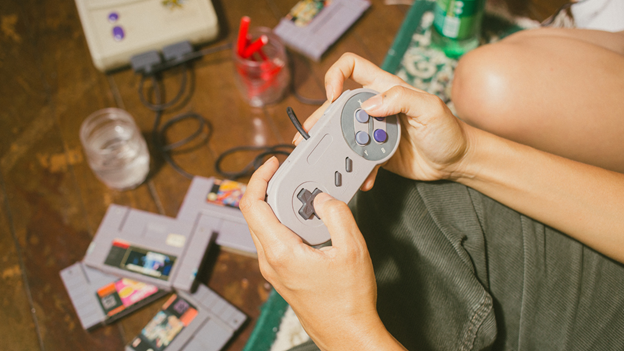The History Of Video Game Addiction

Video game addiction over the last decade has become more prevalent than ever, thanks to the help from the World Health Organisation recognising the behavioural addiction as an official mental health disorder. Many people blame video game addiction on the complexity and wide variety of games in the 21’st century. However, while these factors do hold some significance; cases of addiction have been recorded throughout various times in history suggesting that there are some timeless themes here.
Content
Video Game Addiction Through Time

An international Gaming Research Unit at the University of Nottingham Trent carried out an analysis of the literature on video game addiction over the last three decades. Their findings are fascinating and have implications for the current video game addiction treatment we use to this day. Allow us to break down the instances of video game addiction through time.
The 80’s
The 1980s were the arcade era with the three most popular titles being Asteroids, Galaxian and Space Invaders. Of course, some highly popularised honourable mentions are Pac Man and Donkey Kong. While we’re sure that there have been some cases of addiction in relation to these soon to be Nintendo titans, none were recorded in this study.
The main gaming console at the time was the Atari 2600 which young children who begged their parents would receive if they were lucky. This was the beginning of the gaming culture as it would be common to head over to a friends house to play together in person, something becoming less and less popular as gaming progresses. As we mentioned the biggest gaming titles at the time were previously only available in arcades but the idea of having these available in your very own home was revolutionary.
The first reports of video game addiction recorded in psychological and psychiatric literature were three cases of a “Space Invaders Obsession” researchers at the time described this occurrence as “computer catatonia” and was arguably the first case of video game addiction. As we now know, video game “addiction” is more accurate than “obsession” as the condition is based more around unhealthy habitual use as opposed to impulse control. Similarly, even the first instances of video game addiction were accompanied by a lack of interest in other activities and neglecting of friendship circles, some of the most common symptoms experienced by those with video game addiction to this day.
The 90’s
The ’90s marked the emergence of gaming titles that hold weight in the current climate such as Super Mario World, Metal Gear 2 and the famous RPG Final Fantasy. With the technological advancements making leaps and bounds this was a gaming industry boom leading to thousands of titles and sequels to previous fan favourites, exciting times for children of the early ’90s!
In the 1990s there was an increase in the investigations carried out concerning video game addiction. These were mainly aimed at home consoles, emerging handheld consoles and pc games as opposed to arcade machines. The leading consoles at the time were the Super Nintendo Entertainment System (SNES), Sony Playstation, Nintendo 64 and also important to mention the Gameboy which massively popularised handheld gaming.
Almost all of the studies on gaming addiction were conducted in the UK by surveying students within a school setting. There were many shortcomings of these investigations as they were all self-report surveys which are understandably inaccurate, especially in the context of interviewing children. Furthermore, the criteria used to assess video game addiction was not exclusive to video game addiction. Instead, researchers used modified criteria from the DSM on gambling addiction. Now, while there are many similarities between video game and gambling addiction they are two different behaviours and should have used their own criteria.
Based on this, the analysis of the findings explained that it’s likely the results represented a preoccupation with video games as opposed to the symptoms of video game addiction.
The 2000’s
By this point, the gaming industry was expanding and evolving so vastly it was difficult to hold down a top spot as other companies would do in previous decades. There was a new focus on online gaming, as this enabled games to be played as part of a community from your very own home. This saw the emergence of massively multiplayer online role-playing games or MMORPG’s such as World of Warcraft and Everquest.
As the industry developed so did the interest in video game addiction with over 60 studies being published on the matter. All of which targeted children, adolescents and students with a handful extending to adults. The good news is that the criteria used to assess these findings were mostly based on an earlier version of video game addiction found in the DSM-IV. The bad news is that these findings will only be representative of the younger generation and children with video game addiction.
As the online gaming scene began to grow the focus shifted towards Internet Gaming Disorder the official term for video game addiction by today’s definition. American Psychiatric Association research showed that embedding the gamer in an online community with shared beliefs, interests and practices endows their gaming with meaning. In other words, the social side of gaming influences how much value we put on gaming increasing its addictive nature.
Neuroimaging carried out in later studies found that video game addiction shares molecular, neurocircuitry and behavioural similarities with other substance dependencies and addictions. Simply put, gaming addiction shares many of the biological and behavioural patterns demonstrated by those with other substance-based addictions. This reinforces the concept of video game addiction being a significant behavioural addiction.
Negative Consequences Of Gaming Addiction

Although some still debate the legitimacy of video game addiction being a real condition. One thing that is undeniably unhealthy is the excessive use of video games. Studies have shown that there are a large number of psychosocial consequences for engaging in excessive video game playing.
These negative effects include:
- Neglecting work and education to play video games
- Losing interest in previous hobbies
- Decrease in socialising time with family, friends and partners
- Damaged sleep quality
- Increased levels of stress and anxiety
- Poorer social skills
- Lack of motivation and attention span
- Poor coping and escapism
- Depression and decline in mental health
Sadly most people addicted to video games play for long hours and are subject to these consequences. Most of the previously mentioned consequences serve as symptoms to help diagnose video game addiction. A lot of the time it is difficult to tell whether or not someone is suffering from video game addiction until it starts to have detrimental impacts on the person’s life. Moreover, it is even more difficult for the addict to notice these symptoms themselves in the midst of their addiction. Hence it’s quite common for loved ones close to the addict to recognise some of these negative effects.
If you believe that someone close to you may be developing a video game addiction try to remain vigilant to some of these effects.
Contributing Factors To Gaming Addiction

A common question we get from a lot of our members is “what causes video game addiction?” There are usually many contributing factors to the development of a video game addiction, therefore it is difficult to give a black and white answer. Our advice is to be aware of the risk factors involved with personality traits, comorbid conditions and biological predispositions in order to be more aware of what has or could lead to gaming addiction.
Personality Traits
Studies have found that the personality traits that are more likely to develop video game addiction are those who demonstrate neuroticism. Which is a disposition to experience negative emotions such as anger, anxiety, emotional instability, self-consciousness and depression. Neuroticism is a key component in the Big Five approach to assessing personality type so those with a higher score in neuroticism could be at risk.
Those who showed avoidant and schizoid interpersonal tendencies were more at risk. Meaning those who suffer from feelings of isolation and indifference towards people. Those with these personality traits tend to find it difficult to socialise, avoid social situations and become very withdrawn. One reason why people with personalities similar to this have an affinity towards video games is the safe space that they allow for socialising.
Video games are mostly played online these days giving the person anonymity and freedom to interact with people of similar interests with limited social consequences. Although this might be seen as a good thing in the short term, a persons social dependence on gaming could lead to the development of video game addiction. Furthermore substituting in-person interactions with those online can shunt the chance of social and emotional growth within the individual themselves.
Finally, those who have high levels of aggression and hostility also have an affinity towards video games. This finding does serve as one reason for the stigma of video games encouraging violence in the youth. Those who already express high levels of aggressive behaviour are simply more drawn to video games as opposed to video games turning them into violent criminals.
Comorbid Conditions
Attention Deficit Hyperactive Disorder – ADHD is a condition that affects peoples behaviour making them restless, inattentive, impulsive and are also known to have a short attention span. Why video game addiction is prevalent in those with ADHD is due to their desire to be hyperfocused. This is a state of high concentration during intense and fast-paced activity that successfully stimulates a person with ADHD.
Most modern video games offer bright flashing lights, fast-paced action, coordination and immersive experience which makes them so appealing to someone with ADHD. If your attention is scattered all of the time it can be a nice relief to find a single activity that can engage you for long periods of time.
Generalised Anxiety Disorder – Those who suffer from anxiety also tend to have an increased likelihood of developing video game addiction. When a person feels constant worry and feelings of anxiety it can be very difficult for them to be alone with their thoughts. Video games allow the person to enter a deep state of immersion the previously mentioned hyperfocus where they do not pay much attention to anything else.
Gaming helps with escapism and running from anxious thoughts and feelings as shown by a study conducted by Maria Di Blasi et al, which explains that video games also reduce the effects of negative emotions which strengthens their problematic coping mechanisms. By constantly running from their negative emotions they hinder their emotional growth and healthy methods of dealing with anxiety. Therefore they rely on video games to soothe the unease of anxiety and exacerbate their addiction to video games.
This point is often flipped on its head by explaining that gaming exacerbates the feelings of anxiety. When a gamer struggling with anxiety does not have video games to escape they will often feel overwhelmed without their vice.
Depression – Similar to anxiety it is stated that those who suffer from depression are more likely to develop an addiction to video games. One potential reason is rooted in the rewards and instant gratification we get from playing video games. The immediate sense of reward, in-game goals and measurable growth often gives players a sense of accomplishment and meaning. Someone who suffers from depression is often plagued with feelings of hopelessness and thus gaming can usually lessen the impact of this.
Although this serves as a temporary escape, the sad truth of developing the addiction and excessive use is that it can often worsen feelings of depression. When a person addicted to video games invests significant portions of their time into gaming, they have nothing much to show for it outside of gaming. Once reaching this realisation, they begin to feel hopeless again and turn back towards gaming as an attempt to preserve the one thing that gives them value.
Given the relationship that gaming addiction has with comorbid conditions we always recommend that our users consult a local medical professional in order to rule these out.
Gender
The data in the studies show that males are significantly more likely to experience problematic video game usage than females. Furthermore adolescent or young adult males are the demographic with the highest likelihood to report any instances of problematic gaming habits. This is not too surprising considering the stigma behind video game addiction being childish. Many adults around the world suffer from video game addiction but refuse to seek help based on shame and embarrassment.
We’re here to explain that video game addiction is nothing to be ashamed of and everyone should find the help they deserve. Most treatments are discrete including video game addiction helplines so there is no need to worry.
Treatments Of Video Game Addiction

Currently, the most effective method of treatment is Cognitive Behavioural Therapy or CBT for short. CBT is a psychological treatment technique concerned with modifying and altering the problematic thoughts that lead to undesired behaviour. In the instance of video game addiction the researchers found several attitudes and beliefs that lead to excessive playing:
- No amount of time spent playing is long enough, a desire to complete everything that the game has to offer
- Heightened emotional responses to in-game rewards and completion which leads to a self-perpetuating cycle of gaming
- Thoughts of developing power and status within the game
- Thoughts of mentally escaping the real world
These inaccurate beliefs and thoughts are most effectively changed through CBT techniques. Most modern forms of CBT incorporate mindfulness practices which have been proven to lessen the feelings of stress and anxiety and improve cognitive flexibility which coincides with the CBT teachings. They also include acceptance and commitment therapy also known as ACT which focuses on allowing negative thoughts and sensations to pass without resistance, in order to reduce suffering and rumination with negative thoughts.
The ability to carry out these exercises as and when they are needed has led to them being incorporated into many forms of video game addiction self help and therapy programs in recent years.
It’s clear that with a behavioural addiction such as video game addiction, the treatments are based on thought exercises and changing the addictive thinking patterns into more sustainable and healthy ones.
Another effective method of gaming addiction treatment is “Motivational Interviewing” this method attempts to promote a favourable attitude change by encouraging addicts to give reasons for wanting to be free from their addiction. Behavioural addictions by definition are behaviours that are detrimental to our health but we continue to carry them out obsessively. Hence by helping the individual to engage with their mixed feelings towards their addiction it can help to shape a commitment in wanting to quit.
As it stands, there is currently no medication to treat behavioural addictions such as video game addiction. All effective treatment methods are based on psychotherapy.
The Future Of Video Game Addiction

Over the last decade, the number of studies conducted on video game addiction has vastly increased but is still far behind more established behavioural addictions such as gambling addiction which has been studied for many years.
With the investigations and scientific findings surrounding gambling addictions, many treatments and preventative measures, as well as effective diagnostic criteria, have been developed. It is widely advertised by all popular gambling companies to be aware of the risk of addiction with slogans such as “When the fun stops. Stop.” and collaborations with organisations who help those with gambling addiction.
If video game addiction within the media follows this trend then spreading awareness shows promise. With regards to treatment, as the diagnosis of video game addiction increases in legitimacy amongst psychiatric and medical circles, it will lead to better testing and interventions for those addicted.
Scientists speculate that there is also going to be an increase in online treatment methods based on the fact that it is convenient, accessible, affordable, anonymous and non-threatening. All of the current reasons why people engage in video game therapy.
Here at The Mindful Gamer, we are optimistic about what the future holds in treating video game addiction. So, if you’d like to learn how to overcome your video game addiction, we are always here to help.








